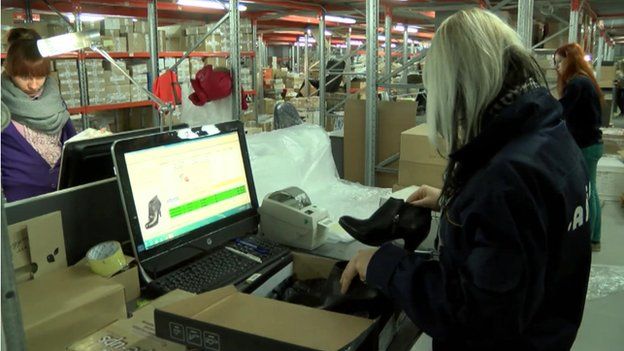Ukraine struggles on brink of economic crisis
- Published

At the warehouse of Modnakasta, one of Ukraine's largest online retailers, the air hums with the lively chatter of workers and sound of hundreds of boxes being packed and sealed.
It sounds like success: clothing, footwear, household goods and bathroom items are all being loaded and then shipped throughout the country.
And indeed the company's owner, Andriy Logvin, says business has rocketed since it began four years ago.
But because of Ukraine's deteriorating economy, he says that right now the company is just managing to keep its head above water. Business has doubled in the past year, but because of the drop in value of the national currency, the hryvnia, he is barely breaking even.
A vicious war is raging in the country's east, where pro-Russian rebels are defying Kiev. The war has killed at least 5,000 civilians and combatants, laid waste to towns and cities and displaced hundreds of thousands.
And Ukraine is facing another potentially monumental crisis.
If Kiev does not find billions of dollars soon, experts and officials inside the country and abroad warn, it could experience an "economic meltdown".
Mr Logvin is bracing for the worst.
"In general, every big business is facing the new year hoping the economy will get better, at least in 2016," he says. "Everybody is aware that 2015 will be a huge challenge, for everybody. This year I'm not planning any positive scenarios at all."
For him, it's a question of survival - yet he is positive. "I think we are ready for the worst-case scenario. We will still be alive."
Coffers emptying
According to some estimates, the country's economy shrank by more than 8% last year, driven in part by the loss of revenues from the war-torn Donbass region, where the country's money-making coal and steel industries are based.
At the same time, Kiev is shelling out billions of dollars: to pay off its international loans, buy natural gas from Russia and prop up the hryvnia which, despite officials' best efforts, has lost half its value since last year, and considerably more on the black market.
So the government has less and less hard currency.
"Every month, every week, the government is losing money," said Alexander Valchyshen, head of research at ICU, a Kiev-based investment fund. "A government that has no money in its coffers is facing a desperate situation."
Now the worry is that hard currency reserves have plunged so low - $7.5bn (£5bn) at the last estimate - that the government might be unable to pay off its international loans, possibly as soon as next month.
If the worst happens it could be like the 1998 Russian financial crisis. Ukraine would default on its obligations, some banks would be forced to close, the currency would plunge and Ukrainians could see their life savings decimated.
The situation has alarmed the international community. But where could the money come from to rescue Ukraine?
IMF steps in
A mission from the International Monetary Fund (IMF) arrived in Kiev this month to discuss releasing about $5bn from a $17bn bailout programme agreed last year.
Up to now, the fund has disbursed about $4.5bn to Ukraine. But even if the next tranche is released, it may not be enough. Officials and experts now say Ukraine will ultimately need another $15bn on top of the money already promised.
None of this money is a given. All of Ukraine's potential donors - the US, EU, IMF - say Kiev must first show a commitment to reform: cut its bureaucracy, tackle corruption and, above all, reduce government spending.
The talks with the IMF are therefore considered crucial. If the fund is satisfied with Ukraine's programme and releases the tranche, this could be a signal that other Western donors will do the same.
"Currently, everything is in the hands of the IMF," ICU's Mr Valchyshen said.
But so far, the reforms have failed to happen. President Petro Poroshenko and Prime Minister Arseniy Yatseniuk have taken small steps towards introducing the measures required of them. But the most transformative actions remain on paper.
The country's long-awaited anti-corruption bureau has yet to begin work, largely because it still lacks a director. Even when it starts to function, though, it is not clear what powers it will have.
Crucially, government spending is still overshooting the target. This year's budget - passed by parliament after a stormy debate in the early morning just before New Year - failed to sufficiently rein in spending.
Public discontent
Many of the most important financial questions have been left open and will be revisited in February, Prime Minister Yatseniuk said.
The delay is largely due to fear of the backlash any cuts will probably unleash, from both sides of the political spectrum.
On the one hand, business leaders are said to be resisting scrapping subsidies and loopholes that they have long enjoyed - such as the domestic gas price, which is well below the market level.
On the other, the population at large is anxious - understandably, given the worsening economic situation - about the likely rise in the cost of living, and social welfare cuts.
Hundreds of protesters rallied outside parliament last month against what they believed would be cuts to government-supported sectors of the economy.
Olexander Danylyuk, head of Ukraine's reform council and an adviser to President Poroshenko, said he understood people's fears, but in the end some suffering would be unavoidable.
"People don't like their financial support to be cut," he said. "[But] we can't avoid pain right now. Given where we are we have no other choice. We don't have much time."
- Published4 December 2014
- Published21 November 2014
- Published21 June 2023